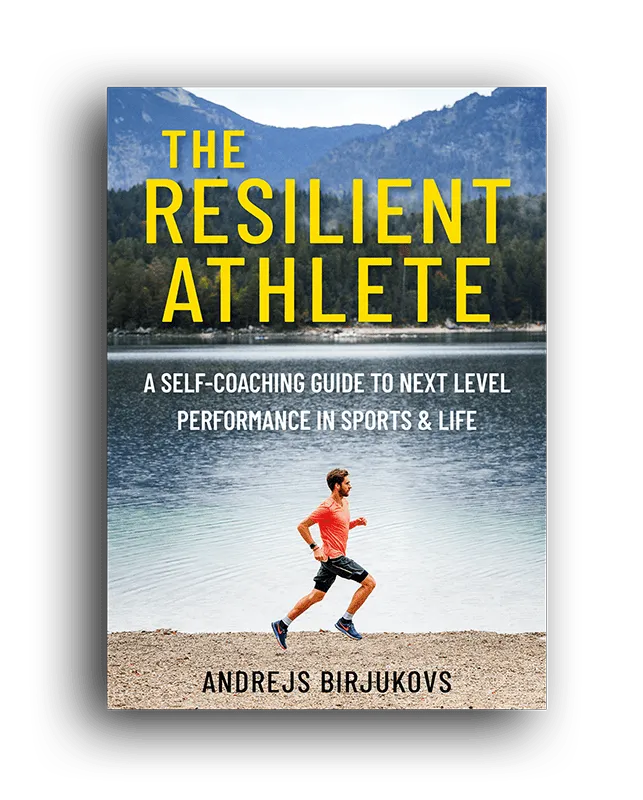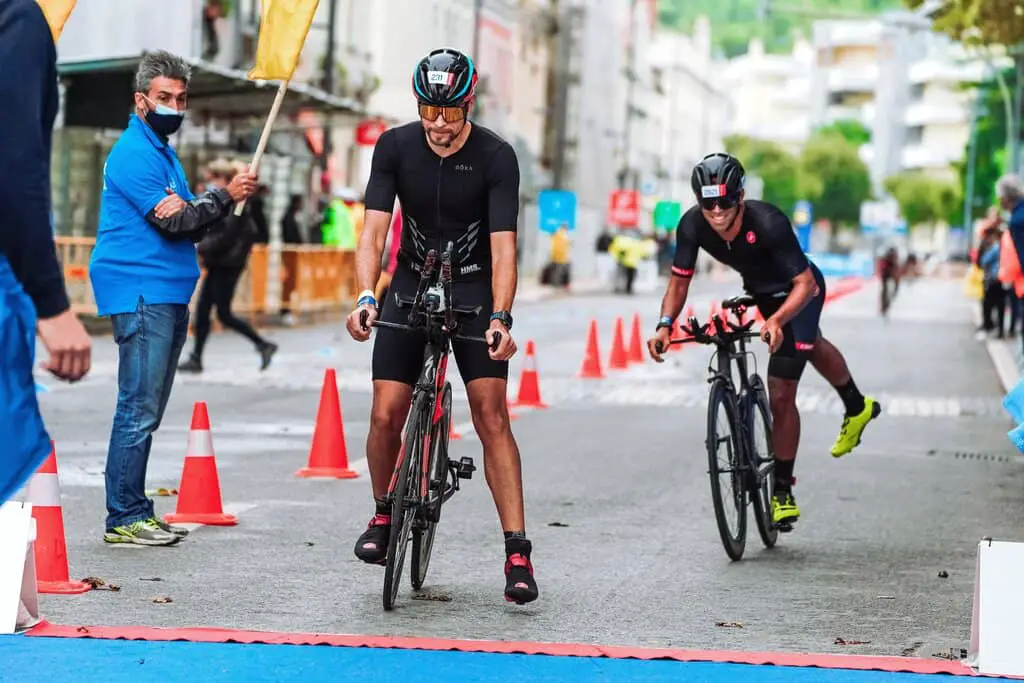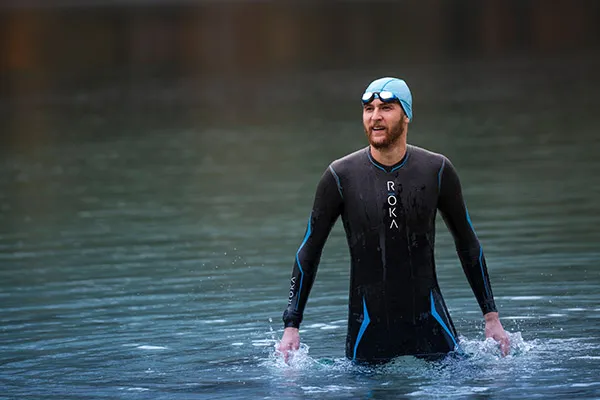Pre-Race Anxiety? 12 Ways How To Calm Nerves Before A Competition
If you are a competitive athlete, chances are you’ve suffered from pre-race anxiety at least once in your career. It comes up in the form of restlessness and being extra nervous about how the race will turn out. Butterflies in the stomach that mutate into nausea. Mind that races and imagines the worst possible outcome. Heart rate increases and the entire body almost boils up. Overall, the body feels as if after a few shots of espresso.
In such condition it’s easy to burn all the matches even before the race begins.
When it comes to racing, it’s not only about how the body feels. Being prepared mentally (to suffer, to handle setbacks or even to navigate uncertainty) is equally as important as physical training. Which is why learning how to calm nerves before a competition can help a lot to deliver the best possible performance on the big day.
In this post I’ll share my personal strategies and techniques how to calm nerves before a competition. Try them out and find what works for you.

Why do I get nervous before practice or a race?
Part of the pre-race anxiety comes from the fact that racing all-out really hurts. “The 1500m provides the most intense pain for the longest duration,” says Alan Webb, American mile record-holder. “If you are racing all out, you feel pain from the very start and then have to convince yourself to hang on for dear life for another couple of laps.”
Personally, I fully agree to that. Racing a 1,000 meter kayak race takes just under 4 minutes, yet creates chest burn and muscle exhaustion like no other distance. And while long-distance events are less intense, they are still quite painful.
It’s not only about the fear of pain, though. Everyone experiences a form of pre-race nervousness. For some it is caused by the fear of mass starts and people being huddled together in a small space. For others it’s the pressure to meet expectations. Pre-race anxiety can even appear from a simple fact of not being organized.
In any race we’re putting ourselves to a test in which we can either triumph or fall short.
Is it pre-race anxiety or just pre-race jitters?
Being nervous isn’t necessarily a bad thing. It can help focus and provide extra energy that you don’t necessarily have on regular practice days. And that is because stress raises the levels of the hormone adrenaline, thereby improving physical capabilities and suppressing pain.
Nervousness only becomes a problem when we don’t know what to do with all that nervous energy and we let it control us. In particular, anxiety or panic attack is nothing more than our brain’s reaction to stress that has spiralled out of control. What happens is, the amygdala (our emotion ‘headquarters’) hijacks the thought process and puts it on a negative loop, which causes stress hormones to cascade. In other words, the brain wanders by itself, eventually getting to dark places. For athletes preparing for a race all that stress creates a lot of unnecessary tension.
The first step to channelling nervous energy is to understand, whether what you experience is just mild nervousness (aka pre-race jitters) or you’re starting to panic and feel anxious.
| Pre-race jitters | Pre-race anxiety |
| I feel good before the start and am looking forward to the race | I am over-excited about the race and feel scared before the start |
| I am feeling physically up and alert | I am feeling physically sick to my stomach |
| I am thinking clearly about what I want to accomplish | I have excess internal chatter and can’t think clearly or calmly |
| I feel ready to tackle any challenge that comes my way | I am worried about what I might encounter during the race |
| I feel my heart beating harder, but I think it’s natural and helpful | I feel physical sensations (i.e. high heart rate, dizziness) that worry me |
| When the race starts, I relax and get into the flow | I feel anxious or tight well after the start and it may last for the entire event |
| I have energy to keep going until the end of the race | I feel drained and exhausted before the competition even starts |
How to turn nervousness into excitement
We can’t control thoughts that pop into our minds. However, we can discipline our minds to change perspective and focus on more exciting aspects of the situation.
Keep in mind that stress response is generated in our brain. Thoughts enter our mind and over the course of many repetitions become the stories we tell ourselves. These stories trigger certain feelings which, in turn, trigger an emotional reaction (in this case anxiousness or panic) that brings the story alive and make it sound true. If we keep telling ourselves I’m not ready for this, eventually our brain will find reasons to believe that and will react emotionally to it by growing more and more anxious. Like an endless loop.
To break the pattern of nervousness or negative self-talk all we have to do is reframe the story we tell ourselves.
The main opponent for the athlete is always within – it’s fears, doubts and insecurities that circle around in the head. If we can triumph over those, there’s no limit to what we can achieve. Just like we condition our physical body, we are able to train our minds to not respond to every little stress factor. In other words, to tune out unhelpful thoughts, let those go and focus on the positive instead.
| Destructive mindset | Positive mindset |
| I am not ready for this | I can do this |
| Swimming in open water scares me | My fears don’t control me |
| Others look so much stronger than me | I trained for this and I’ll do my best |
| I can’t push myself any harder | I’ll push just a little bit more |
The key to emotional regulation is not to learn to stop the thought process. Instead, it is to become more self-aware. To have a clear perception of our unique identity, including our strengths, weaknesses, thoughts, beliefs and even internal drivers.
Among other things, being mindful of your thoughts helps to recognize destructive thinking patterns and change them into something that empowers you. In racing this is a major factor that determines how deep an athlete can dig and not get impacted by his doubts.
Read also: Peak Performance Mindset – 21 Secrets How To Achieve More In Life

Long-term strategies how to calm nerves before a competition
A lot about training and racing is connecting with ourselves – our potential, performance and the present moment. However, in the spirit of competitiveness that connection often shifts to tangible results. Beating a personal best, building more muscle or dropping more fat – that’s just how athletes are wired.
So, if we wish to develop confidence and avoid pre-race anxiety, then the best place to start is within. By reconnecting with ourselves and the present moment to begin to recognize the stories we tell ourselves. It’s only through that connection we can master our minds and influence our emotional state.

The Resilient Athlete
A Self-Coaching Guide to Next Level Performance in Sports & Life
Are you aiming to become a resilient athlete who is able to withstand any pressure? Be able to jump on any opportunity? Take any challenge life throws at you head on?
Then this book is for you.
Learn more#1 Practice visualization to prevent pre-race anxiety
In one of his interviews Michael Phelps’s coach Bob Bowman shared how Michael had a hard time managing his attention and energy early in his swimming career. He was unable to focus in class, was easily distracted and some teachers even raised concerns to his mom that Michael wouldn’t go on to achieve much in life. However, after many years of consistent relaxation and visualization practice every night he built a skill that helped him stay focused and confident under tremendous pressure.
Michael Phelps’s secret is that in his daily practice he envisioned the entire race, start to finish. He went through every stroke and knew how many he needed on every length of the pool to get from one wall to another. So, when the pressure was on and it was time to perform, he could literally do it with his eyes closed. He already envisioned the race in his head, so when the obstacle appeared he knew he could deliver.
You can do the same in the lead up to the race. Try to create a mental image of yourself and watch it from a distance – like television. Aim to envision both the positive and the negative – think of everything that can go wrong and imagine what would you do in that situation.
Read also: Reach Your Full Potential With This Powerful 3-Step Process
#2 Start a journal to analyze the source of pre-race anxiety
Maintaining a consistent practice of noting down events, thoughts and feelings is very helpful for building mental strength. Writing down emotions and feelings helps to recognize thought patterns and learn to control them. Over time it will make an athlete more resilient to various emotional stimuli and allow to better focus on the things that matter.
Start a training diary and keep the content of it to yourself. Be very honest about how you feel about a particular situation and how do you handle emotions in general. For example, if you had pre-race anxiety in the past, try to analyze what series of events/thoughts caused it. Take a hard look at your emotional health and try to come up with one or two improvement actions or healthy habits you can adopt. If you feel stuck, discuss your finding with a coach or someone whom you believe has your best interest at heart.
8 questions to ask yourself to help channel nervous energy
The reason why many athletes don’t journal is because they don’t really know what should be recorded. And how to use it afterwards.
One way how to calm nerves before a competition is to evaluate troubling thoughts by providing an honest answer to the following questions:
- Where does this thought come from?
- Where will this thought lead me?
- Will this thought get me where I want to go?
- Will this thought build me up or tear me down?
- Could I share this thought with someone else?
- Where did this thought originate from?
- Does this thought make me feel guilty?
- Does this thought show me as a mature and balanced individual?
Practical techniques how to calm nerves before a competition
The best state of mind athletes can approach the competition in is to feel at the top of their game – focused, fully engaged in what they do and have no doubt about their abilities. That mental state is called Flow.
When we are in the flow everything seems to fall into place by itself. We are aware of the environment around us, yet don’t stress about it. We feel the breath and the movement of our body parts, but are not concerned about getting tired. We’re in tune with our body and mind and are able to channel that energy towards something. That awareness, absolute confidence and focus on the goal make us feel almost invincible.
We tend to experience flow when we enjoy what we do – and we can only do that when we’re fully present. So, here are some tips on how to enter the flow, stay in it and channel your nervous energy into good!
#3 Turn to your role models. Or make yourself one
Looking up to someone can be a very powerful motivational trick for any situation in life. As humans we’re drawn more to characters and personalities – not necessarily results. So, when you feel pre-race jitters or become increasingly nervous, ask yourself What would my role model do? or How would my role model handle this situation? and act accordingly. This simple trick can put you in control of the situation and create an empowered state.
The most effective way to use a role model is to make yourself one. Craft the identity you desire and use your future self as a role model for the behaviour and results you wish to achieve. Turn those questions to yourself – What would your ideal self do? What actions, habits and thinking patterns got you to succeed?
#4 Set multiple race goals to minimize internal chatter
One of the ways how athletes can focus on the present moment is to minimize distractions. And, in particular, reduce that internal chatter when the brain jumps from one thought to another thinking what if?
Personally, I found that when I don’t have a clear goal my mind gets scattered around. As if I’m trying to focus on everything at once. Which is why I have adopted a practice of writing down exactly what my goals for the race are. And, in particular, break them down into three categories – easy, reasonable and best-case scenario – to ensure I have various ways to succeed. Here’s an example from my recent marathon race:
- Easy goal – Remember to repeat the mantra ‘the pain does not control me’ during hard patches
- Reasonable goal – Stay relaxed and within Zone 3 until the 25K mark
- Best-case scenario – Sub-2:55 marathon finish
Focusing on multiple goals helps to create a race strategy and also to avoid throwing in the towel mid-race, if it looks like you won’t achieve your best-case scenario.

#5 Create a checklist to minimize pre-race jitters
Not planning what to do in the lead up to the race can result in many last-minute decisions and rush. This will, without a doubt, add unnecessary stress that can even impact the end result on race day. Race weeks can be very stressful and a checklist is a great tool how to calm nerves before a competition.
A well-crafted checklist and a packing list can help an athlete stay organized, avoid forgetting something and reduce the likelihood of experiencing pre-race anxiety.
Read also: 18 Practical Time Management Hacks For Athletes And Busy People
#6 Rely on your support team to calm nerves before a competition
Talking to someone is a powerful way to relieve stress and reduce pre-race anxiety. However, be mindful of whom you network before the competition.
If there’s someone in your life who tends to bring you down, cause you to doubt yourself, or just make you more nervous, do what you can to protect your energy and avoid that person before a competition. In one of his interviews Arnold Schwarzenegger laughed about how he used ‘mental combat’ tactics on his opponents. He would make silly comments about how they looked and their internal doubts would make them push themselves too hard in training or force mistakes in competitions.
Instead, talk to a loved one, a family member, your coach or even a teammate – anyone who knows you well. For some reason, they always know what to say to someone before a race to make them feel invincible. If you have to get them on the phone the day of (or day before) the race, do that – reach out and ask for support. Everybody needs a good hype person!
#7 Create a personal mantra to turn nervousness into excitement
At its core, a mantra is a sound or a phrase through which we mindfully focus our thoughts. When under pressure or in times of doubt a mantra helps to distance yourself from the cause and focus on entering into an empowered state – the flow. Especially when you create one that is meaningful to you.
To be powerful, a personal mantra needs to be spoken out loud again and again with absolute certainty. When you do it with passion, you start to believe what you’re saying and become certain of it. You engage your nervous system with the full force of your focus, emotion and body, which helps you enter into flow.
Think about the situations that make you feel stressed or in which you feel powerless. Decide what you want to be or feel instead and create a phrase to condition yourself to become that person. Here are some of the examples you can use:
- I am vibrant and full of energy
- I am in control of my life
- I am more powerful than my pain
- My fears don’t control me
- I am becoming the best version of myself
- I am unstoppable
#8 Reduce pre-race anxiety by practicing meditation & breathing techniques
Meditation is a great way to improve focus, as well as develop mental strength and resilience. One of the benefits of meditation for athletes is the mental resilience that it helps to cultivate. The ability to cope with fear, quiet down the doubts and focus on giving your best. And doing so without looking at others.
The purpose of meditation is to recognize when the mind has wandered. From there it’s all about having the mental strength to let go of the distraction that captured our attention and bring the mind back to whatever we were focusing on. Each time we succeed at this we improve the skill and it gets easier to notice and manage distractions in the future.
In fact, a great way how to get started with meditation is to simply focus on the process of breathing. Try to focus on the feeling of the chest moving up & down and resist the temptation of thinking of something else. Imagine how the body fills up with oxygen & energy during inhalation and how all muscles relax during exhalation.
Read also: How To Become A Better Athlete – 38 Practical & Useful Tips
#9 How to calm nerves before a competition with a power move
An anchor is a certain trigger to a desired internal response which is typically created during a peak experience. The idea behind the process is to save an empowered emotional state (flow) and everything connected to it (feelings, thoughts, sounds, etc.) and associate it with a certain movement. When practiced enough, that powerful state can be accessed at any point of time by repeating the movement.
Coaches use the power of anchors to instil a certain state, behavior or thought pattern to an athlete. You can do that to yourself as well by creating your power move.
Think of an activity that makes you feel energized and excited. Recall a peak experience or imagine yourself winning a competition you’ve trained hard for. You’re overflowing with joy and emotion – what pose or a move you feel like making? Fist in the air? Flexing a muscle? Imitating breaking through something? If it’s music that gets you going, how do you move when your top song is playing?
Once you have an idea of a signature move, it’s all about practice. The more energy you can bring to the move, the better you’ll get at entering the flow. When you are in an empowered state or in a great mood, practice it to remember it. And when you are in a passive state, use the move to energize yourself and recall the emotions you had when you felt on top of the world.

#10 Listen to music before the race
The same anchor principle applies to music. If you were in a great mood and a certain song was playing, chances are the next time you hear it you’ll recall that good feeling as well.
Use music to ‘pump yourself up’ and get in the zone. Create a playlist of songs that make you feel like a million bucks and focus on the feelings, emotions and the mental state that these bring up. Don’t worry about the words or the kind of music – all that matters is whether it puts you at ease and into the flow.
#11 Create a routine how to calm nerves before a competition
Humans love certainty and feel great when they know what to do. So, create a routine that you follow daily and don’t change it on race day. Eat the same breakfast you would eat on a normal day. Dress in the same way you’d normally dress. And follow the same schedule you normally would. This will make you feel like “oh yeah, I know what I’m doing here. I got this.”
If the race requires special preparations (like early breakfast before a marathon or a bike-check before a triathlon), create a special routine for that and practice it on your key training days.
#12 Stick to your warmup routine to reduce pre-race anxiety
Warmup is a crucial component of the training process. Physiologically, it increases the core body temperature, promotes blood circulation to deliver oxygen and nutrients to the muscles and brain quicker, and removes any muscle tightness which might slow down that blood flow. All of it sets the body up for better performance by extending time to fatigue, improving power and speed, and boosting energy and focus.
However, besides physiological benefits it has a positive effect on the mindset as well. When athletes go through the usual motions to get ready for the race (or training practice) they switch their focus to a ‘different frequency’ and tune in to the present moment, which helps to get in the right mood.
In a way, warmup creates momentum and guides the athlete to the flow state.
Any great performance requires some warming up. If you feel stuck, low on energy or struggling with motivation – just start somewhere and focus on the next immediate action. Don’t make judgements on how you feel about a particular activity or action before you begin.
What’s next
Try out some of these strategies and techniques for channelling nervous energy and see which ones work best for you. You might even find a method of your own! Everyone needs something different when it comes to managing nerves before the race, so find your rhythm and stick to what makes you feel good! And don’t forget to comment below what does work for you.
Have an opinion? Share via links below and tag @theathleteblog
Andrejs
GET A FREE TRAINING PLAN
Subscribe to my email list and get access to a free 4-week “back in shape” training plan
You’ll also get two full-body strength sessions and some other goodies!

How did I get here?
Hey there! My name is Andrejs and I am here to inspire, entertain and get you fit for any adventure.
I went from being an over trained pro athlete to an endurance coach sharing how to listen to your body and live life to the fullest.
Traveling, new sports & activities brought new meaning to my training and made it much more effective, fun and enjoyable. And I'm here to help you do the same.


